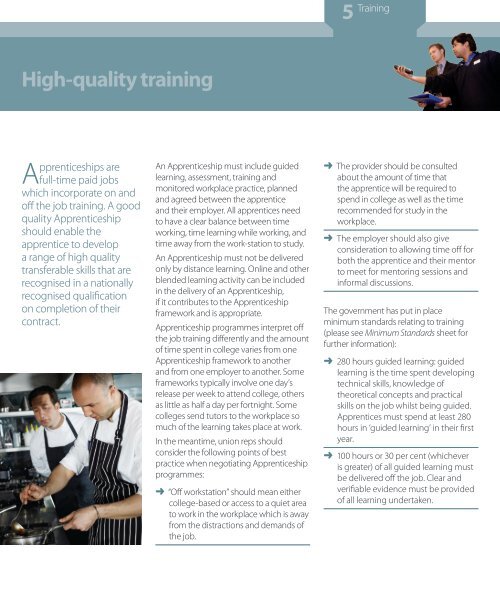TUC Apprenticeships pack inserts (7a)
You also want an ePaper? Increase the reach of your titles
YUMPU automatically turns print PDFs into web optimized ePapers that Google loves.
5<br />
Training<br />
High-quality training<br />
<strong>Apprenticeships</strong> are<br />
full-time paid jobs<br />
which incorporate on and<br />
off the job training. A good<br />
quality Apprenticeship<br />
should enable the<br />
apprentice to develop<br />
a range of high quality<br />
transferable skills that are<br />
recognised in a nationally<br />
recognised qualification<br />
on completion of their<br />
contract.<br />
An Apprenticeship must include guided<br />
learning, assessment, training and<br />
monitored workplace practice, planned<br />
and agreed between the apprentice<br />
and their employer. All apprentices need<br />
to have a clear balance between time<br />
working, time learning while working, and<br />
time away from the work-station to study.<br />
An Apprenticeship must not be delivered<br />
only by distance learning. Online and other<br />
blended learning activity can be included<br />
in the delivery of an Apprenticeship,<br />
if it contributes to the Apprenticeship<br />
framework and is appropriate.<br />
Apprenticeship programmes interpret off<br />
the job training differently and the amount<br />
of time spent in college varies from one<br />
Apprenticeship framework to another<br />
and from one employer to another. Some<br />
frameworks typically involve one day’s<br />
release per week to attend college, others<br />
as little as half a day per fortnight. Some<br />
colleges send tutors to the workplace so<br />
much of the learning takes place at work.<br />
In the meantime, union reps should<br />
consider the following points of best<br />
practice when negotiating Apprenticeship<br />
programmes:<br />
➜ ➜ “Off workstation” should mean either<br />
college-based or access to a quiet area<br />
to work in the workplace which is away<br />
from the distractions and demands of<br />
the job.<br />
➜➜<br />
The provider should be consulted<br />
about the amount of time that<br />
the apprentice will be required to<br />
spend in college as well as the time<br />
recommended for study in the<br />
workplace.<br />
➜➜<br />
The employer should also give<br />
consideration to allowing time off for<br />
both the apprentice and their mentor<br />
to meet for mentoring sessions and<br />
informal discussions.<br />
The government has put in place<br />
minimum standards relating to training<br />
(please see Minimum Standards sheet for<br />
further information):<br />
➜➜<br />
280 hours guided learning: guided<br />
learning is the time spent developing<br />
technical skills, knowledge of<br />
theoretical concepts and practical<br />
skills on the job whilst being guided.<br />
Apprentices must spend at least 280<br />
hours in ‘guided learning’ in their first<br />
year.<br />
➜ ➜ 100 hours or 30 per cent (whichever<br />
is greater) of all guided learning must<br />
be delivered off the job. Clear and<br />
verifiable evidence must be provided<br />
of all learning undertaken.


